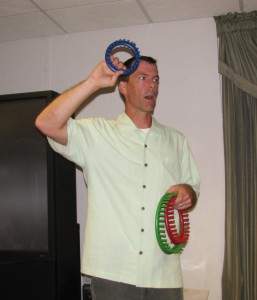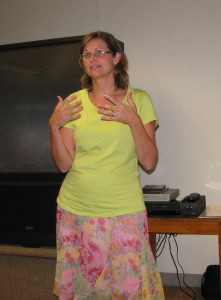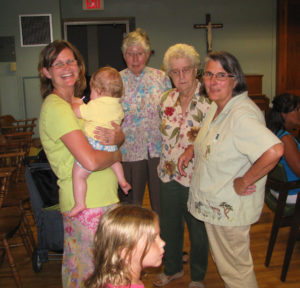Steve Zika displays some of the different size looms that can be ordered with the craft kits.
The craft kit includes a ball of yarn, a loom, a hook and needle tool, instructions, a KidKnits tag and a short biography on the woman who made the yarn, all in a handmade bag.
KidKnits has two purposes, Steve said. “To help the women of Rwanda with sustainable jobs” and “as an education vehicle to teach our youths about the people of another country. When you knit a hat, you are supporting a woman in Rwanda,” Steve said.
Wiley spent two months in Rwanda developing the correct price for the yarn, and KidKnits agreed to buy all the yarn the women produced. The bakery idea was abandoned and instead the 10 women who were going to be bakers began spinning yarn in January 2011. In July 2011, Steve, Ellie and Steve’s parents traveled to Rwanda to better understand production, and that’s when it became Steve’s full-time job. He had been working in the high technology industry, but decided to leave that and move the family back to Peoria.
Kristin Zika explains the curriculum that has been developed for KidKnits.
When they arrived in Rwanda, the number of women making yarn had grown to 20, and now, a year later, it is 35. “We begged them to grow, the demand for yarn is great,” he said. “Ellie was able to teach all 20 women how to knit their own hats,” Steve said.
Over 200 people are supported by these 35 women in Rwanda, Steve said.
The craft kits were sold to Ellie’s friends, Girl Scout troops and Sunday school class. “We learned we had a vehicle to educate kids that they could make a difference in the world,” Steve said.
“We wanted to show kids that whatever their gifts, they are needed in the world,” Kristin said. “Kids want to hear that, they feel so empowered. We’ve developed a curriculum. When we’re in a Christian environment, we talk about the power of the Body of Christ, and in a secular environment, we talk about being part of a movement,” Kristin said.
Trained as an engineer, Kristin taught science one year in a Catholic school before having Ellie and deciding to be a full-time mother. “Now I know God let me have a peek at teaching so I can teach KidKnits,” she said.
Steve Zika holds a ball of yarn as he talks with Sister Suzanne Sims following the presentation.
Part of the curriculum teaches children about the dignity of work, that it’s better to provide a sustainable job than just to raise money and give it to people, Steve said. “The kids all get that,” he said.
As the program grew, it was apparent the women in Rwanda could not produce enough yarn, Steve said. “It takes three women all day to make one ball of yarn in Rwanda,” he said. “More yarn means more craft kits. We needed another partner,” Steve said.
Kristin found the Casa Ursulina website and emailed Sister Ruth four months ago. Steve and his father visited Chillan in June for a week and met the 14 women who are spinning yarn for them, and two who are making the kit bags. “We needed yarn that has a story,” Steve said. “Poverty in Chillan is different than in Rwanda, but it’s still poverty. We’re very excited about working with Casa Ursulina.”
The five colors of yarn that come from Chile are different than the five that come from Rwanda. Chile will produce turquoise, yellow gold, purple, light red and natural white.
Kristin Zika holds 8-month-old Wally as she visits with (from left) Sister Ruth Gehres, Sister Eva Boone and Sister Mimi Ballard.
“We’ll work on biographies of the women in Chile making the yarn,” Steve said. There are no employees other than the family members, although Steve concedes that 8-month-old Wally hasn’t contributed much. “Ellie started KidKnits when she was 9. Cora and Laynie are advisers, it’s good when you market to children to have kids as advisers,” he said.
Sister Mimi, who was in Maple Mount for the Ursuline Sisters Community Days, brought 28-30 rolls of yarn with her. The craft kits from Rwanda are sold online now (www.kidknits.org) but the kits featuring the Chilean yarn will not be sold until this fall, as an inventory of yarn is built up. The Zikas work with schools in Texas and Illinois, and usually recommend hat-making projects for fourth or fifth graders.
KidKnits also has different sized looms for other purposes (toddler hats, doll hats, a tablet holder). The kits retail for $22 online, or $18 to schools if they buy in bulk. KidKnits has received online orders from 15-16 states, and sold its first kit to someone in England recently.
By Dan Heckel
Links with more information



